Infant Baptism or Believer’s Baptism: Which is Correct?
Infant baptism vs believer’s baptism (a.k.a., “adult baptism”): Which is correct? And why is baptism important anyway? Here’s what you need to know about Christian baptism.
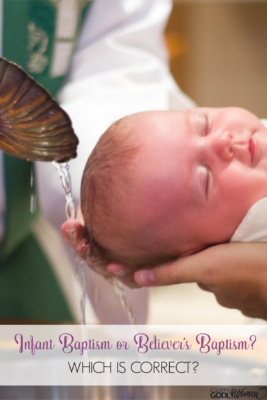 When my oldest son was born, my husband and I had a decision to make: Would we baptize him as an infant or wait?
When my oldest son was born, my husband and I had a decision to make: Would we baptize him as an infant or wait?
My husband was baptized as an infant in the Catholic Church we still attend today. I was baptized in 4th grade at the church my family happened to be attending at that time. Which one was correct?
Both Catholics and Protestants see baptism as very important, and yet the two groups differ on details such as when a person should be baptized, how a person should be baptized and what baptism does, exactly. Hopefully this post will shed some light on the various positions.
First, let’s start with the basics.
What is Baptism?
At its most basic, baptism is a practice common to all Christian churches that brings new members into the faith. It uses water and words in a special ceremony.
There also has to be the intent to baptize someone — kids “playing church” can’t accidentally baptize each other!
A person can be immersed (dunked all the way!) in water, or water can be sprinkled.
A Christian baptism invokes the Trinity with the words “I baptize you in the name of the Father and of the Son and of the Holy Spirit.”
Some baptisms also include the words, “…buried in the likeness of His death, raised in the likeness of His resurrection” to declare the new life in Christ.
Christening vs Baptism: What’s the Difference?
The terms baptism and christening are often used interchangeably, but there is a slight difference.
Baptism is the ceremony with water and words to admit someone (baby, child, or adult) into the Christian faith.
Christening is a naming ritual that isn’t often used anymore. Way back when, a child was baptized and given an official Christian name at the same time. Now, people usually just mean “baptism” even when they say “christening.”
In this post, I am talking only about baptism.
How Did Christian Baptism Begin?
Did Jesus Invent Baptism?
Before Jesus: Baptism was around before the beginnings of Christianity. It is not a Christian invention. Jesus himself was baptized by John the Baptist, probably in a Jewish purification ritual called a mikvah.
Jesus did command his followers, “Go, and make disciples of all nations, baptizing them in the name of the Father and of the Son and of the Holy Spirit” (Matthew 28:19).
So Jesus didn’t invent baptism, but He did command it and establish it as part of Christian practice.
After Jesus: Some Jewish-Christian communities began baptizing converts around the time Christianity began. The converts were first interrogated to make sure they believed in Jewish teachings. Then they were baptized naked (and males were circumcised!) in order to become fully accepted into the community. (Both these practices have changed, thank goodness!)
Is Infant Baptism in the Bible? How About Adult Baptism?
There is some question about whether or not the Bible mentions infant baptism. It does say that “households” were baptized (Acts 10 and 16; 1 Corinthians 1), but there is disagreement as to whether or not this included infants. It does not say that only adults were baptized.
The Bible does not explicitly mandate either adult baptism or infant baptism.
220 A.D.: The oldest explicit account of infant baptism we have today is by Tertullian around 220 A.D. This is about 120 years after the last book of the Bible was written, but Tertullian is one of the earliest writers to describe the early Christian church.
What Was Christian Baptism Like After Jesus?
In the early church, adult baptism was the norm because Christianity was so new that most people converted into it, rather than being born into it.
Adults were required to convert before they could be baptized. However, both infant baptism and adult baptism were practiced without conflict. Both methods were acceptable and people were pretty much free to choose.
Early Church Fathers: Not a single church father found infant baptism unlawful, though they all had their own opinion on when the “optimal” time for baptism. There was no serious controversy about when baptism should happen.
253 A.D.: The Council of Carthage condemned the practice of withholding baptism from infants until the eighth day, and infant baptism became the new norm. Infant baptism was practiced nearly universally until the 16th century.
416 A.D.: Infant baptism was made compulsory by Roman Law.
16th Century: During the Protestant Reformation, some Protestant groups began to question whether infant baptism was actually Biblical. Some groups re-baptized people; others began waiting till people were adults. Not all Protestants switched sides however. Some Protestant groups (including Lutherans, Presbyterians and Methodists) maintained the practice of infant baptism even till today.
Today: Christians practice both infant baptism and adult baptism. This is the same mix that existed in the early church, but not everyone gets along like they did in the early church. (When researching for this post, I found a TON of very heated, opinionated and hateful arguments. It was very annoying.)
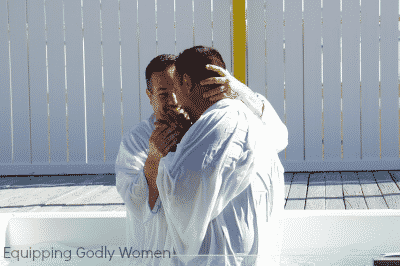
What is Adult Baptism (or Believer’s Baptism)?
Beliefs and practices vary between Protestant churches, and there is no “official” Protestant baptism belief. I’m sharing the practices of the Baptist church I grew up in, and comparing them with the Catholic baptism practices I’ve learned about.
Many Protestant church practice “adult baptism,” also called “believer’s baptism.” Adult baptism is for those old enough to make a conscious decision to be baptized and make their profession of faith.
This is sometimes called “adult baptism,” but it depends on the ability to make a profession of faith, not really on age. Kids as young as 7 are commonly baptized with believer’s baptism.
What is Infant Baptism?
The Catholic Church and many mainline Protestant churches, such as the Episcopal, Reformed, and Lutheran churches, practice infant baptism. Babies as young as a few days old are baptized, and godparents make the baptismal promises for the baby.
Many Catholics baptize their babies as soon as reasonably possible. They do this quickly because they believe that a baby’s salvation depends on baptism removing original sin.
Does Baptism Remove Original Sin?
First, what is original sin?
Original sin simply refers to our fallen human nature, and the tendency of humans to choose sin. Saying that a baby is born with original sin does not mean that the baby has committed a sin.
Catholics believe that baptism is the way to remove original sin from someone’s soul, regardless of age. They cite the following verses (italics added):
Peter replied, “Repent and be baptized, every one of you, in the name of Jesus Christ for the forgiveness of your sins. And you will receive the gift of the Holy Spirit. The promise is for you and your children and for all who are far off—for all whom the Lord our God will call. (Acts 2:38-39)
To those who were disobedient long ago when God waited patiently in the days of Noah while the ark was being built. In it only a few people, eight in all, were saved through water, and this water symbolizes baptism that now saves you also — not the removal of dirt from the body but the pledge of a clear conscience toward God. It saves you by the resurrection of Jesus Christ.” (1 Peter 3:20-21)
He saved us, not because of righteous things we had done, but because of his mercy. He saved us through the washing of rebirth and renewal by the Holy Spirit. (Titus 3:5)
We were therefore buried with him through baptism into death in order that, just as Christ was raised from the dead through the glory of the Father, we too may live a new life. (Romans 6:4)
Jesus answered, “Very truly I tell you, no one can enter the kingdom of God unless they are born of water and the Spirit.” (John 3:5)
The concept is also expressed in the Nicene Creed, which states, “I acknowledge one baptism for the remission [or forgiveness] of sins.”
Why Is Baptism Important for Infants?
Protestants will say that baptism should be a personal choice, but Catholics counter that with a couple arguments to support infant baptism.
First, waiting for baptism could have grave consequences.
Say your baby was sick and dying and you had a medicine that would cure him. Would you wait until your baby was old enough to choose the medicine? Or would you, as the parent, make the best choice for the child, considering the grave consequences? Baptism is viewed as healing a soul born into original sin.
What’s more, Catholics recognize that the child still has personal choice.
Even baptized babies can still grow up to be nonbelievers. Infant baptism isn’t forcing anyone to be a Christian. Baptism simply removes original sin while the baby is too young to choose. A child can grow up to sin all they want if they like.
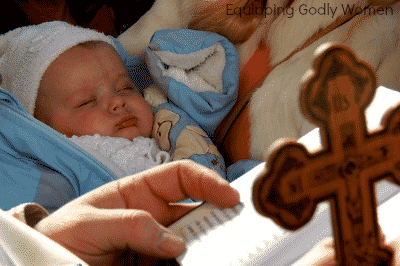
But the Bible Says People Have to Become Christian First!
Where? It’s true, the Bible gives several accounts of people who gave a profession of faith and then were baptized. But there is a difference between reporting what some people did, and giving instructions to people. The Bible isn’t an all-inclusive manual to Christianity.
And remember, Christianity was a brand new religion when the Bible was written, so more people were converting to it than were being born into it. As babies were born into Christian communities, new practices developed and were accepted. This is why we turn to church history to fill in the blanks.
Why Is Baptism Important for Adults?
People are baptized with adult baptism because they choose it as a symbol of faith — it is not to remove original sin. In Baptist and other Protestant churches, they’ve already made a decision to follow Jesus.
So if they are already Christians and don’t need baptism to remove original sin, why choose to be baptized at all?
- Baptism is important because the Bible commands it: “Repent and be baptized” (Acts 2:38).
- The purpose of baptism is to make a public profession of faith (though it doesn’t actually have to be public). This is important as an individual and communal declaration — “I am a Christian, in this community of Christians.”
They don’t do it because they believe that baptism has any power in itself.
- In Protestant baptism beliefs, baptism does not forgive original sin. (That happens prior, when a person repents and makes the conscious decision to follow Christ, or “accepts Jesus as personal Lord and Savior.”)
- Baptism is a rich symbol, but it’s just a symbol. It doesn’t necessarily “do” anything.
Interesting Fact: Martin Luther, leader of the Protestant Reformation, believed that baptism was more than a symbol. He believed that it offers forgiveness from sins and grants eternal salvation.
Why Is Infant Baptism Important for Catholics?
Infants are baptized because parents choose it. For Catholics, baptism is a means of salvation because it washes away the effects of original sin.
- By washing away original sin (and since babies are too young to commit personal sin), baptism guarantees salvation if a baby were to die young.
- The Bible commands baptism, and Catholics see no good reason to withhold the graces or to wait.
- Infants should be baptized as soon as possible, as their salvation depends on it.
Catholics don’t baptize someone as “just a symbol” — they believe that baptism has a real spiritual effect.
HOWEVER:
- While baptism guarantees salvation for infants, once the person reaches the age of reason, they must then consciously choose to follow Jesus. Otherwise, they can lose their salvation. (Baptism removes original sin, not personal sin committed later after knowing that something is wrong.)
- Similarly to how Protestants added baby dedications, Catholics added confirmation, in which a Catholic young person makes their official profession of faith.
What Is the Typical Baptism Age?
The typical baptism age for adult baptism is anywhere from the age of understanding (around 7 or 8) to any adult age. For believer’s baptism, you may be too young to be baptized, but you are never too old.
The typical Catholic baptism age is from just a few days old to any adult age, including on the deathbed. For Catholics, you are never too young or too old to be baptized.
Interesting Fact: At one point, many people began putting off baptism until they were on their deathbed. This was because the church believed that baptism washes away all mortal (serious) sin, and people didn’t want to risk getting baptized, committing a mortal sin, and then having to do penance afterwards. So they would wait.
Do You Have to Be Baptized to Go to Heaven, According to Protestants?
Protestants believe that you do not have to be baptized to go to heaven. They do see baptism as an important step in Christian life, for sure:
- Baptism is a part of following the Bible’s commands.
- Baptism is a public declaration of a fundamental belief.
- And baptism identifies you with a Christian faith community
But baptism is not necessary for salvation — you can choose whether or not to receive it.
Do You Have to Be Baptized to Go to Heaven, According to Catholics?
Catholics believe that baptism is a part of salvation, and a person must be baptized to go to heaven. (But keep reading!)
The Bible says that baptism is necessary for salvation, and Catholics take this very seriously.
But Catholics also believe:
- Martyrs are considered “baptized in blood” and have all their sins wiped clean at the moment they die (even if they were never baptized by water).
- If a person dies before they could be baptized, but they truly desired to be baptized, that’s enough for salvation (this is called “baptism by desire”).
- While infants are usually baptized by a priest or a deacon, anyone — even a non-Christian — could baptize a person, especially in an emergency situation, and it would still be considered valid.
How Many Times Can You Be Baptized?
Baptism should happen only once in a Christian’s life.
Infant baptism was not really controversial until the Reformation. Then the Anabaptists began re-baptizing people who had already been baptized as babies, saying that baptism must happen after the age of reason (“Anabaptist” means “baptize again“).
For Catholics, baptisms done in other Christian churches are still considered valid as long as they are done with water (immersion or sprinkling, it doesn’t matter) and with the words “in the name of the Father and of the Son and of the Holy Spirit.” Someone was baptized this way doesn’t need to be re-baptized if they convert to Catholicism.
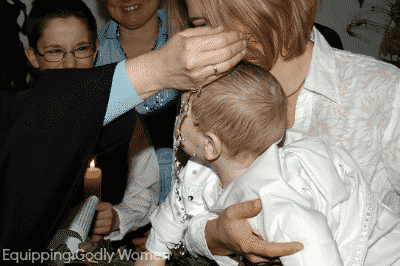
What are the Requirements for Adult Baptism?
In the Baptist church that I grew up in:
- People should be baptized of their own free will.
- They must be old enough to understand what baptism is and what it means.
- They must make a confession of faith.
- Classes may or may not be required.
A white robe is often provided, but is not necessary.
What Are the Requirements for Catholic Baptism?
In order for the Catholic Church to recognize a baptism as valid, there must be three things:
- Water
- The words ‘in the name of the Father and of the Son and of the Holy Spirit’ (or some version thereof, naming all three)
- The intent of baptizing.
Also, in most cases, you will also need at least one consenting parent or legal guardian, and reasonable assurance that the child will be raised Catholic.
Catholic godparents, special clothes, candles and oil are all customary as well, though not required.
What Is a Typical Believer’s Baptism Like?
Who: Anyone who believes and is old enough to want to be baptized. Believer’s baptisms are typically done by the pastor.
Where: Many churches have a baptismal font right behind the stage, which is accessed from behind. People also have the option of getting baptized in a river, pond, lake, etc., which sometimes happens at special church camps or events.
When: Some churches keep the water warm to baptize anyone who wants to come forward and “accept Jesus” at the end of the service on any given Sunday. Others will wait and have a baptismal service where they baptize several people at a time.
How:
- People are baptized by full immersion to symbolize Jesus’s death, burial and resurrection.
- They typically wear a robe with normal clothes underneath (and bring clothes to change into for afterwards!)
- The pastor will generally give a short introduction and the person will probably share their testimony.
- The pastor will ask the person some “Do you believe” type questions to make sure the person is a believing Christian.
- The pastor will dunk the person while saying “I now baptize you in the name of the Father, and of the Son and of the Holy Spirit.”
- Much applause and rejoicing from everyone watching!
- And yes, you can hold your nose! (I know; you were curious.)
For infants: In denominations that don’t baptize infants, there is often a baby dedication ceremony instead. Basically, the mother and father present the baby (or toddler) in front of the congregation and promise to raise the baby in the faith. In turn, the congregation promises to do everything in their power to help, and the pastor says a prayer that the child will grow up to know God.
What Is a Typical Infant Baptism Like?
Who: Anyone. Babies born into Catholic families are generally baptized as infants (from birth to the first few months of life). Children over 7 years and adults are baptized upon conversion and completion of education classes about the Catholic faith (RCIC or RCIA).
Where: At the baptismal font, usually in front of the church.
When: Typically on Sundays. Either during mass or after mass as part of a private ceremony for family and invited friends.
How:
- The parents and godparents state their intentions/promises for the child (to baptize them and raise them in the Catholic faith).
- The priest, parents and godparents make the sign of the cross on the baby.
- One or two Scripture passages are read.
- Prayers are said.
- The baby is baptized in the name of the Father, Son and Holy Spirit by immersion, pouring or sprinkling. (Any method is fine. Immersion is rare, but it isn’t unheard of!)
- Candles are lit.
- The baby is anointed with oil.
- The priest blesses the parents.
- The baptismal certificate is filled out and filed.
Unlike the Protestant practice, which is pretty informal and doesn’t take more than 5 min at most, the Catholic practice is generally longer and more formal.
You can find a detailed description here: Rite for the Baptism of One Child.
Information about the symbolism of the various parts here: The Symbols of Baptism: How Do They Work?
And a personal account of one baby’s Catholic baptism here: Blessings Abounded at Our Baby’s Baptism.
Thanks to those of you who were up late with me on Facebook last night filling me in on all the details!! 🙂
So What Did We Ultimately Decide?
Like I mentioned in the introduction, when our first son was born, my husband and I had a choice to make about infant baptism vs adult baptism: Would we baptize him in the Catholic Church or not?
Here’s what we decided.
First, we met with a priest to learn more about Catholic baptism. It was during this meeting that I first learned that the Catholic Church believes that baptism washes away sin. This was news to me! After about an hour in the church basement, they sent us home with a pamphlet.
Over the next few days, I poured over the pamphlet and the Scriptures. At first, I found plenty of verses that seemed to support my Baptist position on adult baptism. Then, I found quite a few verses that seemed to support my husband’s Catholic position on infant baptism. I wasn’t completely and utterly opposed, but I definitely wasn’t convinced.
I told my husband that I had some reservations about baptizing our son in the Catholic Church since I didn’t wholeheartedly agree with everything the Catholic Church teaches about what that meant. BUT I also said that I would let him make the decision as the spiritual leader of our family. Whatever he chose, I would support.
We didn’t end up baptizing our son in the Catholic Church.
Instead, one night my husband decided he couldn’t put it off any longer, we both woke our son up, and my husband baptized him right there on a towel on our living room floor! (Yes, you can do that!)
This was the absolute perfect solution for us. My husband and I were (and still are) in complete agreement about our decision, and so far none of the priests we’ve mentioned it to have had any problems with it. We baptized our second and third children the same way.
Later, so that their baptisms would be officially recorded in the church, all three were baptized in our Catholic church in a beautiful, private ceremony for just our family. These were conditional baptisms, which is what the Catholic church does for people whose previous baptism that is a little unsure (this is not considered “re-baptizing” — remember, once is enough!).
Conclusion
Personally, I think if the early Christian church can get along–we should be able to too. While I don’t see anything wrong with being baptized as an adult, I also don’t see any good reason to wait either.
I’d love to hear your thoughts though! Leave them in the comments section below!
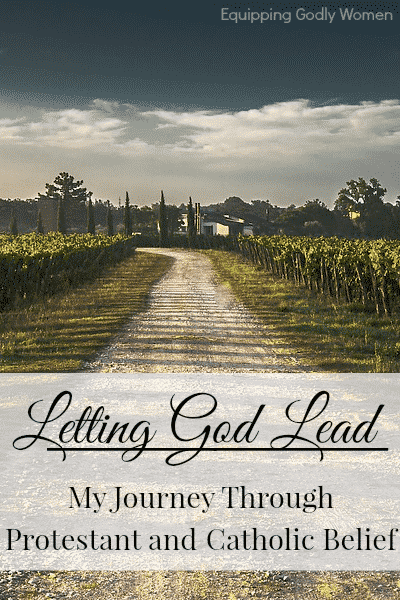
This is post 9 in my series Letting God Lead: My Journey Through Protestant and Catholic Beliefs. While you can read this post by itself, I encourage you to check out the rest of the series as well. Find all the posts plus additional resources here, or read individual posts from this list below.
The Day I Realized My Religion Got it Wrong
10 Common Catholic Church Myths that Critics Believe
Is the Eucharist Really Just a Symbol?
Who has the Ultimate Authority? A Biblical Look at Sola Scriptura
A Brief Look at the History of Christianity
What All Christians Should Know About Priests, the Pope and Confession
What Do Catholics Really Believe About Mary, Saints and Statues?
Infant Baptism or Believer’s Baptism? Which is Correct?
What is Purgatory? What are Indulgences?
Why Do Catholics….? Honest Answers to Your Burning Questions
Protestant and Catholic Beliefs Series Conclusion
Resources and Further Reading
I’m not asking you to believe because I say so. Please DON’T take my word for it! The purpose of this series is only to share what I’ve learned on my journey in order to inspire you to begin a journey of your own. Here are a few helpful resources to get you started.
*This post contains affiliate links, which means if you make a purchase, I may make a small commission at no additional cost to you. Thank you!
Catechism of the Catholic Church
Christian History Made Easy by Timothy Paul Jones, PhD
http://www.aboutcatholics.com/beliefs/a-guide-to-catholic-baptism/
http://www.beliefnet.com/Faiths/Catholic/2004/04/What-To-Know-Before-Your-Babys-Catholic-Baptism
http://www.catholic.com/documents/how-to-become-a-catholic
http://www.catholic.com/tracts/baptism-immersion-only
http://www.catholic.com/tracts/infant-baptism
http://catholicbridge.com/catholic/infant_baptism.php
http://www.churchhistory101.com/feedback/water-baptism.php
http://www.gotquestions.org/infant-baptism.html
http://www.gty.org/resources/sermons/80-369/Is-Infant-Baptism-Biblical

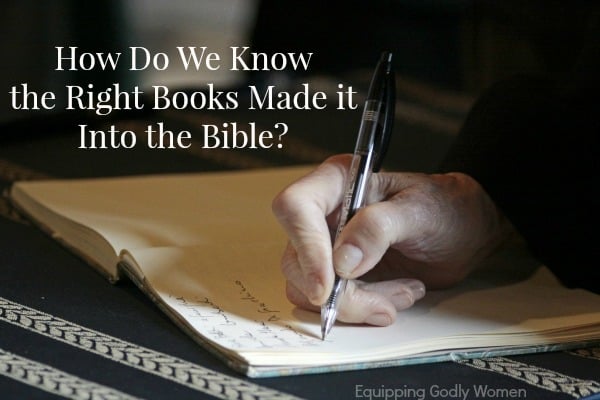

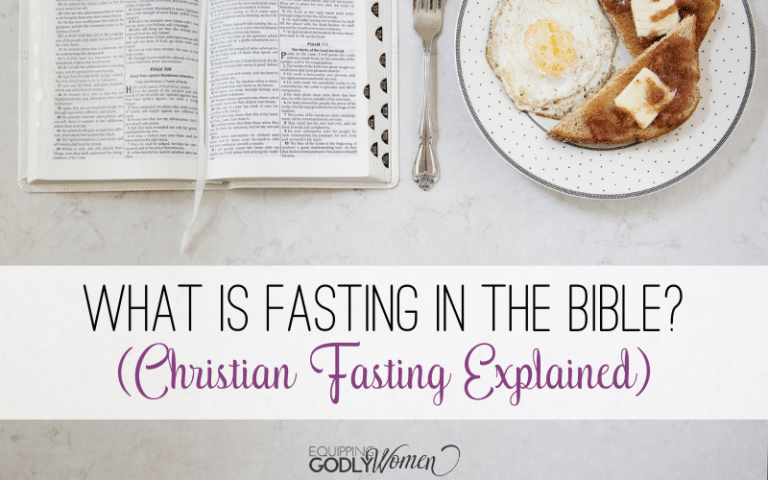
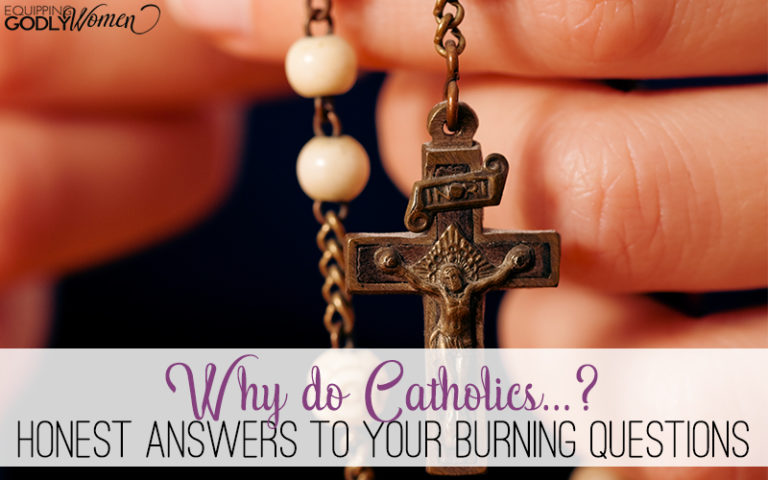


This is such a wealth of information! Thank you for compiling it all! I was baptized as an infant in the Catholic Church. Later, after falling away from the church for a time in my late teens/early 20’s, I felt compelled to be baptized again, in a Baptist church. Now, nearing 40, I’ve been a confirmed and practicing Lutheran for over a decade. I don’t believe that either practice is wrong or sinful, but God has recently revealed to me that I received a gift through my infant baptism and that the Holy Spirit held me close through my wandering years because of it.
Absolutely. This whole series is absolutely jam packed with tons of information. I hope you’ll take time to check out some of the other posts as well! Here is the link: Letting God Lead: My Journey Through Protestant and Catholic Beliefs
Brittany,
I think you did a great job laying things out in this post.I enjoy learning what Catholics believe..
I would say the baptist way is most biblical.I see over and over that it is believers getting baptized and not babies.I don’t see any examples or anything telling to us to do so.If babies need to be baptized to be saved then what happens to the ones who do not get baptized?Then also now if they can grow up and never hold to any faith then the baptism did nothing for them.
If we are saved by God’s grace alone apart from works then baptism would be something one would have to do before God “could” save them..
As for the one “baptized in blood”. Could a Muslim, who holds to a false belief of God be saved while denying the one true way, but was a martyr ? thanks so much.
You are putting in such good work in this series! Thanks for letting us all benefit from your studies.
I am coming from a life-long Catholic background, so keep that in mind. I have always wondered why Protestants seem to minimize the importance of baptism. Even in your article and others’ comments the concensus seems to be, “Well, it must be important since Jesus told us to do it.” However, the sinner’s prayer seems to be the protestant equivalent of the Catholic’s view of baptism as the emphasis is placed on that declaration of faith, and the baptism as a nice little follow up that you get to eventually. That doesn’t make sense to me. At the very end of Matthew’s gospel, the very last thing Jesus says is” Go, therefore, and make disciples of all nations, baptizing them in the name of the Father, and of the Son, and of the holy Spirit. teaching them to observe all that I have commanded you. . . ” (Mt 19-20). The very last command he gives is to baptize and to teach. He doesn’t say, go therefor and make sure everyone accepts me as Lord and Savior. Also, he says to baptize them and teach them. So there is teaching going on AFTER the baptism because though one commits to Christ, conversion is a continual process.
I also like these quotes from Augustine because he is showing continuity in affirming earlier church fathers which is just a cool illustration of apostolic tradition. And he’s well known. 😉 Augustine
Augstine:
“What the universal Church holds, not as instituted [invented] by councils but as something always held, is most correctly believed to have been handed down by apostolic authority. Since others respond for children, so that the celebration of the sacrament may be complete for them, it is certainly availing to them for their consecration, because they themselves are not able to respond” (On Baptism, Against the Donatists 4:24:31 [A.D. 400]).
“The custom of Mother Church in baptizing infants is certainly not to be scorned, nor is it to be regarded in any way as superfluous, nor is it to be believed that its tradition is anything except apostolic” (The Literal Interpretation of Genesis 10:23:39 [A.D. 408]).
“Cyprian was not issuing a new decree but was keeping to the most solid belief of the Church in order to correct some who thought that infants ought not be baptized before the eighth day after their birth. . . . He agreed with certain of his fellow bishops that a child is able to be duly baptized as soon as he is born” (Letters 166:8:23 [A.D. 412]).
Also, simply, the bible doesn’t say anything against infant baptism. It seems to reason with the number of people converting through the apostles’ teaching, that the issue would simply come up in scripture. We see Paul do this with another great sacrament, the Eucharist, where he warns about proper admittance to the sacrament and warns against “eating and drinking unworthily.” He talks about marriage. He talks about head coverings, for goodness sake. If infant baptism was an improper application of the sacrament, I can’t imagine Paul would remain quiet on the issue.
Hey, it’s a great benefit to me too!
I think the reason is because so many verses say “repent and be baptized” together. Protestants believe the forgiveness of sins happens at the “repenting” half of that equation (often through the sinner’s prayer), while Catholics believe that it happens at the “be baptized” part. Time and time again you see both together. Both sides think both aspects are important, they just emphasize different parts.
It’s kind of like the question “At which point does the Eucharist turn into the Real Body and Blood?” Well, it’s not like you’re just going to do just that part, so the question doesn’t really matter, and yet we like to define the exact when. If that makes sense?
And yes, from what I’ve read, people did both and no one cared much either way. BUT of course there is a big gap between “Paul didn’t say it was wrong” and “it is the only right way” 🙂
Brittany,
Going back to what Emily said.I as a Protestant I consider it very important to be baptized.The difference would be in obedience after I am saved and not for salvation. Just look at these passages. Everyone is a believer first then getting baptized. Acts 2:41;8:12,8:13,8:36-39,9:18,10:47-48,16:14-15,18:8
Since we are saved by grace and not works (Eph.2:8) We don’t want to change the Gospel into things we must do to get saved.We are told “Believe on the Lord Jesus Christ and you WILL be SAVED.”There is a promise here. Believe and you will be saved. Not here is the things you must do and keep trying and you might be saved.
I don’t believe in a sinners prayer in the sense you can say a magical prayer and live any old way you want and your “saved”. That is not biblical. Man does not seek God,want God or can come to Him without being drawn.(Rom 3:10-11,John 1:13,1 Cor. 2:14,John 6:44)God opened my eyes, I saw that I was a wretched sinner that could not add anything to His Grace.This is conversion. Then the first act of obedience was to be baptized. This represents the old man has been buried and now risen with Christ. My life has been changed radically.I have the Holy Spirit, Christ died for all my sins and I have salvation. Salvation is not a continual process.
Math 28:19 “Therefore go and make disciples of all nations,baptizing THEM in the name of the …. Who do we baptize? The unsaved or disciples? I see disciples here and the others in Acts. also.
Jesus in John 3:3 says we must be born again. This means :born from above” when we are,we have life and the old man is gone and the new one has come. You are adopted and sealed and forgiven as far as the east is from the west.
Paul says in 1 Corth. 1:13-17 that He did not come to baptize but to preach. He did not see salvation depending on baptism. That is why we don’t see any commands to do so FOR salvation.
I say all this in love and don’t mean to come across abrasive, Thanks
Not abrasive at all and I 100 percent see where you are coming from. I grew up believing EXACTLY the same thing. But after all those verses I came across in my Is Faith Alone Enough Post, I have to admit, there certainly are plenty of verses that suggest that simply believing and then going about your day isn’t enough.
For example:
“For it is not the hearers of the law who are righteous before God, but the doers of the law who will be justified.” –Romans 2:13
“If you would enter life, keep the commandments.” –Matthew 19:17
“You see that a person is justified by works and not by faith alone.” –James 2
So yes, your verses support one way and these support another, but you have to take them altogether as a whole.
Do I have any idea how it all works? Not at all! I know we cannot possibly EARN our salvation. It is ONLY through and because of the grace of God. But in light of these verses, I have to believe that works have to play some role somehow. And I would classify the Eucharist, Baptism, etc under that. Not what saves us–Christ does that–but they are important and they must play some part in the whole thing somehow.
Either way, I’m sure both of us are fine. Whether we think it is because of one thing or because of another, I’m sure we are both diligently believing, seeking and doing. But I always enjoy the friendly debates and discussion 🙂
AMEN!!!! And 100% CORRECT!
Brittany:
Thank you so much for taking the time to post this series. I’m in the same place at the moment….born and raised Baptist but married into a Catholic family…and I’m working through the same exact issues. In fact, I just called my husbands church today to make an appointment with the priest to discuss my faith journey. Thank you again. This was such a help!
You are so welcome! I’m glad I could be of some help! Hopefully the priest will be able to sort things out even more. The one I’ve been talking to is quite knowledgeable but also very easy to talk to. He doesn’t seem to mind me peppering him with a million tricky questions 🙂 Hopefully you find the same! (and if not, bring them to me. I can’t promise I’ll know all the answers at all, but I love all the questions!)
I have recently returned to the Catholic Church. I am getting our kids baptized but the whole Godparent thing has been as issue. I could go into more detail, but this isn’t the place. Did you find anything about Godparents in your research?
I haven’t looked into it too thoroughly yet. Is there a particular issue or concern you have? I’d be happy to look it up.
Wonderful website. Thank you for all your hard work and dedication to the research, in creation and maintenance of this gift to Christians everywhere.
One positive criticism in regards to the above article on Baptism: omission of the Gift of the Holy Spirit.
This is a HUGE part of the teaching of the Catholic believe in Baptism as a Sacrament of God yet receives little to no mention in your article. The gift of the Holy Spirit is for all who are baptized and significant.
The gift of the Holy Spirit is mentioned in your own biblical quotes above: Acts 2:38-39; John 3:5; Titus 3:5.
It is also one of the main reasons to baptize infants…you want them to receive God’s presence and power and life. You want the babies, children to have every benefit that God gives as they grow and mature.
Please edit/add this important teaching of the Catholic Church to your article on Baptism.
Again…THANK YOU for a wonderful website. Keep up the great work!
God Bless,
Fr. Joe
Please
Thanks, Fr. Joe. That’s a very important point too! No matter how ridiculously long these articles get, there’s always more that can be added!!
As a born again Catholic, smile, i really appreciate the effort to explain what Catholics believe and to do so in a very loving manner. In John 21,25 it states that not all Jesus did could be written down. If it were the earth could not contain all the writings. This passage, shows the importance of Apostolic Traditional teachings that the church offers. While the bible is important, it dosent contain everything that jesus taught his apostles. This knowledge was handed down to our current priest and bishops.
A few other bits of information
If you attend mass daily, in 3 years, you will have had the entire bible read to you by the priest.
The same readings that are read daily in mass are the same readings read in every catholic church throughout the world on that day.
That’s part of what convinced me to reject the “Bible alone” notion. You can find my post on that here: https://equippinggodlywomen.com/faith/who-has-the-ultimate-authority-a-biblical-look-at-sola-scriptura/ 🙂
The one thing that most people I think have a severe problem wrapping thier heads around is that Dogma…Religion…etc are not faith. Practices, traditions, interpretations and all of the various things that “define” one sect of Christianity from another are simply the wrapping paper for the idea contained inside. Too many people wear a jersey or colours and stand proudly and say “My Faith is the Only True way of seeing this”. It all gets very narrow and prescriptive and in the end there just stands one thing. What does it mean to YOU…and only YOU. Some find Catholicism as being what chimes most with them…some find the Baptist way of doing things as being proper, others lean towards Evangelical and the myriad of other ways of getting to Jesus as what resonated most with them. And in the end that is the basis of this tribalism…you have to stand up for your own way of doing things because to accept any other way means your way might not be correct!!! In the end many cant find peace with there being an alternative, because they NEED to be right. But in the end it is all entirely SUBJECTIVE and PERSONAL. You can not in any way force somebody to accept your interpretation of what is correct…simply because it feels right to you and you are unable to simply live and let live. The beauty of faith is that it makes YOUR life better…YOUR world brighter and brings peace to YOU. How you find it, and what you believe is sacred to YOU. The different denominations matter little…once you find one that rocks your boat just leave the dogma and tradition and all the trimmings of somebody else’s practices alone. They don’t harm you in any way…other than to make you doubt that you might be on the right path. In the end that’s on you…your doubts are your own, not anybody else’s. So don’t make them any body else’s problem. If what you believe chimes with you…allow what the fact that what chimes with somebody else may be different, but no less integral to them and their sense of joy or peace in the world.
Thank you for you thoughts, but I must respectfully disagree. While some matters of faith are matters of preference (like music style and what we should wear to church), many things really aren’t opinions at all. For example, either baptism is good for the salvation of the soul or it’s not. Either the Eucharist is the true body and blood of Jesus or it’s not. Whether you and I agree on these matters really has no effect on whether they are true or not. They either are or they aren’t.
My purpose here isn’t to make everyone think what I think, as though my opinion is worth more than anyone else’s, but to open up a discussion so people have the information they need to make an informed decision that’s as close to the real truth as possible. Hope that makes sense.
For more on why denominations DO matter, I actually wrote a post on the subject a while back: Why Talking About Denominational Differences Matters
Well it seems we must respectfully disagree with each other. I think you see the world in the way that many fundamentalists view it. Through the eyes of absolutism. For what is Truth??? Is it an absolute thing that exists outside of the observer or is it a relative thing that exists within the relationship one hasI think from what you are saying you hold Truth like it is an absolute, immutable and exists outside of you. But if that is true then no part of the Holy Spirit can be a part of you. If you are not part of it then no relationship exists. I have a relationship with that and it brings joy to my life. You have a relationship with it, and it brings joy to yours. But it is not Absolute, because our relationships are different. But if you are seeing it as an Absolyute, then are you not simply observing it and not letting it in. Relativism is sharing yourself with something and becoming a small part of a larger whole defined by relationships where no absolutes exist…and seeing that absolutes are simply the construction of a mind that can not comprehend that is limited and needs to create its absolute world based solely on its relationship in order to feel that their version of the Truth is unassailable. And to such people absolutism is all the have, so its probably better that I save my breath to cool my porridge so to speak. But think on this…no absolutes exist anywhere in nature. Neither in the cosmos nor in time nor space. God created this world built solely upon relationships where absolutes are imaginary and born of isolated thinking in an isolated fashion. He created a wonderous world and all it contains solely on the premise of relativity…..where absolutes do not and can not exist. And I know you will probably tell me that God exists outside this world and His being the sole Absolute but honestly, if He was that way, if He wanted the world to be that way….He would have made it that way. He made the world and everything in it in His own image…and no Absolutes exist. Only relationships…and mine is very wholesome and brings light and joy to my soul, as it does for my parents, and my siblings and my family. So can it be wrong? Only in an Absolute world can it be so. Therefore I must respectfully conclude that it isnt worng…its very much right, and QED, an Absloute Truth does not exist, because not everyone who believes can agree, and its not about agreeing that one way is right and another way is wrong, but agreeing that what is part of the Human soul that is joyous and gentle may experience its own Truth, but it is part of a relationship of all the souls which have ever lived, all bearing witness to the fact that God is part of all of us and exists only if the relationship is sincere and only because of that is it True. Thus Truth is Relative…and not Absolute.
That kind of thinking doesn’t even make sense. Yes, there are plenty of things that are relative (such as the best way to respond to different situations), but there are also tons of things that are absolutes. For example: Is there a God or not? You can’t have both options. There either is or isn’t. Is the Eucharist the body and blood or not? It either is or isn’t. Is the device I’m typing on a computer or not. My relationship with it has absolutely zero effect on what it IS.
Well let me say this then. What IS. I am a Catholic. I was baptised as a baby, took Communion and Confirmed the vows my parents and Godparents made at my baptism, and I have tried to follow my faith in as much as I can. I was also brought up to respect the fact that my faith was personal, and not necessarily the way any other person views theirs, because everyones relationship with God and Jesus is different. If somebody else, such as yourself believes certain things and it works for them, then allow them as long as they arent forcing their views on you. Becuase that relationship is theirs and yours is yours. And all i was trying to point out was that. Relationships matter, and relativity is actually more prevalent and inspiring because it allows for and caters for something uniquely Human. Life. Experience. The chaos of circumstance and chance. If you were born in a different country, say the middle east…you would probably be running a website praising Allah and his prophet Mohammad…quoting the Quaran and walking 5 paces behind your husband with your face covered according to Sharia Law. That you are not, and that you are who you are is totally circumstantial…that you believe what you do is equally circumstantial. However…that you question or query any one elses way of doing things isnt. That is a choice. That is a conscious decision to profess that your beliefs are paramount and somebody elses may be questioned. Because..who cares what Catholics do? Who cares what Baptists or Evangalists do? Why even be bothered or seek to put an opinion out there? Oh yeah….it bothers God apparently. So is passing His judgement the sole bent of the puritanical Christian?
Let me tell you a story. My mother was deeply religious and held a great faith in her Catholic upbringing. She attended mass every Sunday with us and her own mother, another deeply devout Catholic. When I was 12 or 13 I was finding the whole mass thing rather tedious…this whole Jesus and God thing was a bit of a questionable affair. I told my mum…and in her kind way she said this. You are young…you dont know anything about life or living yet. You live under the protection of your dad and I. But dont discount faith. Dont discount its worth and its protection. You are at an age when identity, self awareness and who you are and what you stand for are all shifting and chaotic. But son…just promise me one thing. Find something. Find faith. If its not Catholicism…even if its not Christianity…find something that means something to you. Only when you can sincerely say that this brings you peace, and helps you to be strong, to live a good life and embrace others and embrace life will you know what is True. You cant hide from your soul…it belongs to something bigger and wiser and greater than you. Only when you find it will you be all you were meant to be.
And you know what? That took guts. That took love. That took seeing me as her son and showing that she knew me, she loved ME. Was she wrong in your eyes for doing that? Or should she have rammed her faith down my throat or brainwashed me with endless quotations, an US vs THEM mentality, the fear of hell and damnation, just so we would believe what she did?
When she was diagnosed with cancer, a brain tumour that she fought for 2 years even thought the doctors gave her less than 6 months she gained so much strenght from her faith…her personal faith and relationship with God. When all of us were full of pain, worry, sorrow…she was full of her faith and strength and she held us all together with her simple dignity and love. She never wept, never lay in bed all day feeling sorry for herself, never gave up and to this day that woman and all she was, all she is and will remain in my heart showed me the true meaning of faith. Not in words. Not through force or deception or fear. Just simply by being who she was, and all that her relationship with God meant to her. There were no miracles. No interventions. Because that isnt faith. And it isnt a bunch of rituals or following the bible to the letter either. Its deeply personal. Its deeply Human. And that is the Truth. But according to you…and those like you there are only 2 types of people in the world. Those that believe as you do…and live the bible in a puritanical fashion and denounce pretty much everything else…and the rest of us sinners simply because we dont see the world as you do and thump our bibles at every given opportunity.
So. Please answer me this. Is my mother in heaven…or hell? Because she was Catholic, devoutly so and believed with all her heart in the sarcaments. Because she was blessed by her parish priest and given the Last Rights in front of all her loving family. Because she said the rosary every evening with her mum, and said our prayers with us every night before bed, including the Hail Mary which she always started with. In doing all of this, and in encouraging me to find Truth for myself was she blaspheming and sending her soul and my soul to eternal damnation? In her befriending and having deeply fulfilling friendships with Christians, Protestants, Athiests, even a Muslim or two and never once questioning their faith or even bringing it up in conversation because it truly didnt matter…was she living an unrighteous life, a lazy life not in full service of the Lord, and cavorting with evil? In not living her life to the letter of the bible and not being completely puritanical in her thinking and her living is she now a lost soul? And please…answer honestly, according to your views and what you believe. Tell me what IS Absolutely the truth in this….according to you and your beliefs. Tell me what IS.
Hi Bethany,I'm at the moment a Christian and have been my whole life. Like you I was raised and taught to believe that if you believed in Jesus and that He was the Son of God and died for our sins then we would be saved and have eternal life with him.
I was baptised when I was a baby but then made the decision to be re-baptised as a teenager.
My brother who like me has been brought up as a protestant, is very knowledgeable in God's word and has started questioning our beliefs and has been working with a Catholic Priest for sometime now t nut out all of his questions and compare beliefs against scripture etc. And he has told me he is just about ready to convert but still has a few points he needs clarifies to make his decision.
Anyhow, it was him who passed on your blog address to me and after reading it and speaking with him, I too am shocked to see that what the Catholics believe has quite a large amount of scriptural ground and it just makes sense.
My question in regards to this post (and I haven't read any of the other comments as there are so many so I'm sorry if this has already been discussed) is what about children who are conceived but are lost due to miscarriage? Does their fate come down to whether or not their parents were baptised and followers of Christ?
I have spoken to a friend of mine who is Catholic and she told me that any child who dies because of a miscarriage either goes to hell or is in some place they refer to as limbo...
This to me just doesn't make sense. Why would God create a precious child in the womb only to take he or she before she was born and not have another purpose for them? Surely God who I know to be loving a God wouldn't do that (though I am new to all this and could be wrong).
I also don't understand why he would create a child, who may be born but die not long after or in early childhood, and condemn them to hell because their parents didn't believe or have them baptised.
I know the Bible says that no one knows the mind of God but is there any light to be shed on these points?
And on another note, if I was to decide to convert and become Catholic, would I be allowed to be re-baptised as what I was lead to believe as a teenager about being baptised is very different to what the Catholics teach. If I were I feel it would be a really special thing to do.
Thank you so much for sharing your journey with us all. I'm only up to this post so far and I know you wrote then a year or two ago so I would be interested to know if you came to a conclusion regarding your faith or if you're still searching for the truth?
Love to you and your family :)
Court
Oh my goodness I called you Bethany haha I’m so sorry. I was thinking about another Christian woman who is called Bethany at the same time and am following her journey too.
So sorry 🙂
lol, if only you knew how many times that has happened to me in my life. Not sure what it is about my name and that one, but apparently people like that one better lol! 🙂
Hi, Court!
I’m not entirely sure what happens to miscarried or aborted babies, but I did a little research and apparently no one is really sure as the Bible and church tradition don’t explicitly say what happens. Limbo (that they don’t go to Heaven or Hell, but just sort of hang out in between) has been mentioned as an idea, but there is no official belief.
Catholics do believe in intent, meaning that if a living person wishes to be baptized but dies before they are able to, the fact that they wanted to and would have if they would have had the chance should be enough (I belief).
Here’s an article I found, but you should probably speak to a priest for more info. https://www.catholicherald.com/faith/your_faith/straight_answers/straight_answers__do_aborted_children_go_to_heaven_/
As to getting baptized yourself: When I was asked if I needed to be baptized again, they said it was unnecessary and a Protestant baptism counts. You would have other rituals you go through, namely confession, which is kind of like the Catholic equivalent of the Protestant baptism. But, even if it’s not needed, I don’t know if you could request it. You would have to ask about that too.
And as far as myself: I’m still stuck in limbo over here too. Learning and reading a lot still, but haven’t been fully convinced yet. Everything I wrote in this series is still my beliefs.
Hope you find the rest of it helpful and let me know if you have any other questions!
I appreciate your thoughts on this, as I too have struggled with what God says to us about baptism. I was baptized and raised in the Catholic faith, married a WELS Lutheran, and shortly after marriage joined the Lutheran church. Our kids were baptized as infants, but then later in life I had a falling away from the faith (through my involvement with yoga and new age beliefs being presented). Thankfully, the power of Christ brought me back to faith because, after all…through my baptism, I belonged to Him!
After becoming aware of who I am, a redeemed child of God with a renewed faith and hunger for God’s Word, I wondered if I should be re-baptized. I read articles with supporting Scripture on both sides and honestly could see the validity of both sides. Often, I feel people in believer-baptism churches appear more on fire for the Lord. Yet, as a parent, I would not want the pressure of convincing my children they need to make “a decision” for Christ. Infant baptism is a blessing because it depends not on what we do, but rests on God’s promise that He will be with our child always, until the very end of the age. And, if we are “sinful from birth, sinful from the time our mother conceived us” it makes sense that baptism should be done as soon as possible. The Bible does not talk about an age of accountability. Yet, when it comes to what happens to stillborn or the young that did not receive baptism…that is where questions go unanswered, and I have to trust in God and say “Will not the Judge of all the earth do right?”
I’m not sure why I wrote this, except maybe to convince myself of what I still believe. In my studies today I was examining different viewpoints on baptism and came across your blog. It still remains a bit of a mystery to me. Oh, and I did not get rebaptized because after much prayer I was led to Acts 10 where the Voice says to Peter “Do not call anything impure that God has made clean.” That solidified it for me…the mystery of faith…the new creation I was in Christ was because He had already cleaned me at baptism. I was just growing up in my salvation! God bless!
There’s definitely a lot to think about. For me, I figured infant baptism certainly couldn’t hurt anything, so we went ahead and got all of our baptized young. I figured they could always get rebaptized again later if they wanted to, but then that’s what confirmation is for, so I doubt they ever will. But anyways, it’s not like God’s up in Heaven with this checklist of things going “Oh… I see you did x and y but not z…. tsk tsk tsk.”
Courtney,
You are not wrong. God is a fair and a just God. He would never condemn his children to hell knowing that they did not know the truth. That would neither be just nor loving, which would defy his purpose. God’s work and His glory is to “bring to pass the immortality and eternal life of man”. Those who are innocent and do not know right from wrong i.e. children, people with mental disabilities etc. will not go to hell. In fact, they go straight to heaven. I hope that brings you comfort.